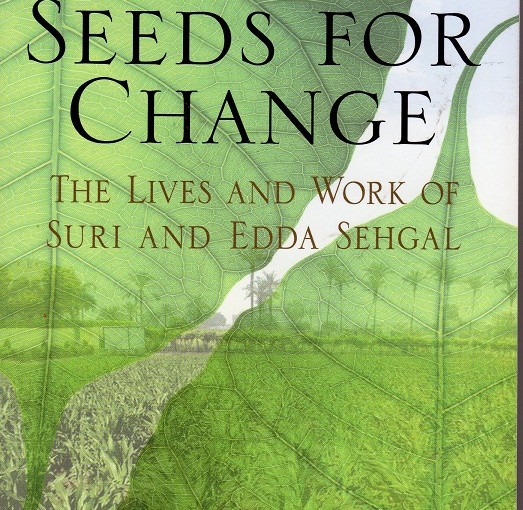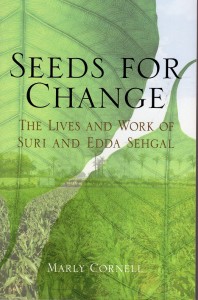Book Review: Seeds for Change by Marly Cornell
This is a biography of Surinder “Suri” and Edda (nee Jeglinsky) Sehgal, the founders of the Sehgal Foundation. That foundation helps rural villages in India achieve clean water, improved agriculture, better education and more honest government, as well as funding conservation and ecological efforts around the world.
Both of them were refugees as children, Suri when his family wound up on the wrong side of the border during the partition of Pakistan and India, and Edda when her home in Silesia was about to be overrun by the Soviet Army during the end of World War Two (and then was attached to Poland in the post-war process.)
Suri grew up to become a crop scientist, specializing in hybrid corn, and came to America to pursue his graduate studies. Edda was invited to the U.S. to serve as the au pair for the Henry Kissinger family. They met and fell in love. Suri got a job with Pioneer, creating their first international research station in Jamaica, and the couple got married.
They settled down in Iowa and raised a family, and with a combination of hard work, diplomacy and good management skills, Suri rose to eventually become the president of Pioneer’s overseas operations. Unfortunately, there was a management change at the company, and the new CEO felt uncomfortable with the decentralized nature of Pioneer at the time.
According to this book the new management of Pioneer fired Suri and attempted to frame him for stealing trade secrets, as well as gutting a joint venture in India that Mr. Sehgal had an independent interest in. (A book from the perspective of the Pioneer management might tell the story differently.) The ensuing lawsuits were settled in Suri’s favor, and the independent company he rebuilt was successful enough to create the Foundation.
There’s a lot to like about this book. Suri and Edda’s life experiences are interesting and shed light on areas not often brought to the attention of most Americans. Edda is very much depicted as Suri’s partner who he could not have succeeded without. If the text sometimes seems overly flattering, this is understandable due to it being written specifically to promote the Sehgal Foundation.
I found the writing style a little flat. A discussion of the children’s part-time jobs is given the same tonal feel as Suri’s trek across India as a shoeless refugee to find a relative whose location he only knows by a general region, which could use a bit more emotional weight.
There are genealogical charts at the beginning of the book (there are a lot of relatives that come in and out of the story) and a color photograph section in the middle. Citations are done in footnotes, and there is no index.
Proceeds from the sale of this book go to the Sehgal Foundation, so that might influence your decision whether or not to purchase.
I would especially recommend this books to readers with an interest in immigrant stories.
Disclaimer: I was provided with a free copy of this book by the author for the purpose of undertaking this review. No other compensation was involved or requested.



Sounds like an interesting saga – a love story, a bit of intrigue/drama, and a foundation of philanthropy. I’ve been thinking a lot about our individual and collective power to be seeds of change, and how interesting you’ve reviewed a book with this name.
While there are many books titled “Seeds of Change”, this one is “Seeds *For* Change”, a much less common title.
I always appreciate your total honesty Scott, and although I love memoirs and travel writings I’m not really interested in foundations. But I do appreciate your review. Our grand daughter traveled to some 3rd world country to help build water wells, it may be right up her alley.
Indeed it might! Shoot her a link, please.
Sounds intriguing living the life of an immigrant in Iowa with what was going on with that company. I like how you mentioned that another book might have a whole different perspective.
I am unable to find a book on the life of the CEO who fired Suri, or the history of Pioneer during that time period, so this is the perspective I will be aware of for now.
This sounds like a story I’d like to know more about. Thanks for reviewing this one!
You’re welcome!
It doesn’t sound like the book for me. What I always notice when I come to your blog is your diverse choice of books. I’m a big-time bookworm myself, but I tend to be a bit one-sided in my choices. Ok, maybe not one-sided, but I stick with a limited number of sides. I’m going to experiment next time I go to the library and pick a book I’d never usually pick (can’t promise I’ll finish it though).
I’ve deliberately tried to increase the diversity of kinds of books I read since I realized doing my Goodreads bookshelves how lopsided my genre choices were, and that I had strikingly few books with protagonists who weren’t white* guys.
*For varying degrees of “white”–due to my cultural background, most manga protagonists look Caucasian to me, even though I know they’re supposed to be ethnically Japanese.